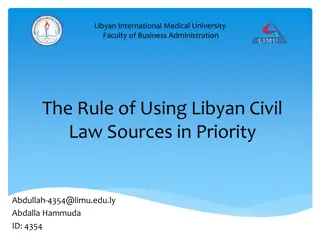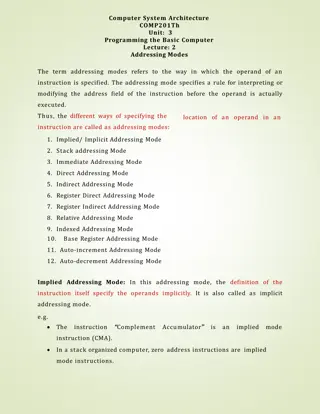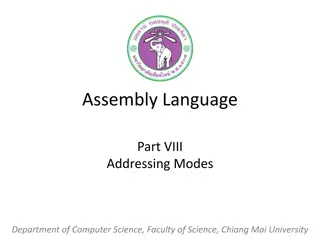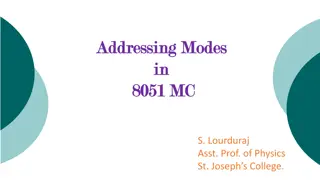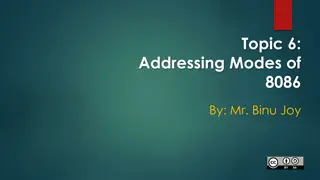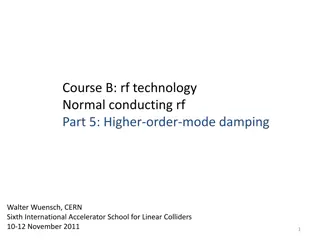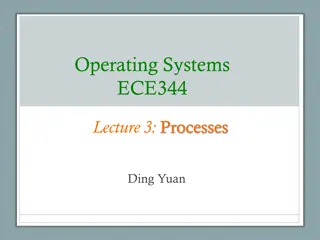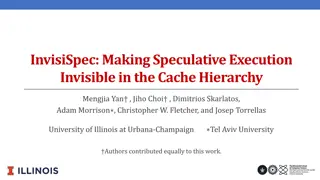Modes of Execution of Decree in Civil Law
The lecture discusses the various modes of execution of decree in civil law, such as execution against a person through arrest and detention, and execution against property. It explains the procedures involved in arrest and detention, including the conditions for release, restrictions on arrest, and exemptions from arrest under civil process. The content also covers the period of detention based on the decree amount.
Download Presentation

Please find below an Image/Link to download the presentation.
The content on the website is provided AS IS for your information and personal use only. It may not be sold, licensed, or shared on other websites without obtaining consent from the author. Download presentation by click this link. If you encounter any issues during the download, it is possible that the publisher has removed the file from their server.
E N D
Presentation Transcript
, -221001 Lecture on Execution of Decree Part-III Dharmendra Kumar Gupta Assistant Professor Faculty of Law
Modes of execution S.51 Execution against person Execution against property By delivery of any property By attachment and sale or by the sale without attachment of any property by appointing a receiver By arrest and detention In such other manner as the nature of the relief granted may require. Generally a decree-holder has the option to choose a particular mode.
Execution against person By arrest and detention Relevant provisions S.51,55-59 and O.21 R.30-32 and 37-40
Procedure of arrest and detention A judgment-debtor may be arrested at any hour and on any day, His detention may be in the civil prison of the district or any other place appointed by the State. For arrest no dwelling-house shall be entered after sunset and before sunrise. No outer door of a dwelling-house shall be broken unless such dwelling-house is in the occupancy of the judgment-debtor and he refuses or prevents access thereto If arresting authority duly gained access to any dwelling-house, he may break open the door. If the room is in the actual occupancy of a pardanashin woman who is not the judgment-debtor the arresting authority shall give notice and reasonable time and facility withdraw such place.
Procedure of arrest and detention Judgment-debtor pays the amount of the decree and the costs of the arrest officer shall at once release him. In execution of a decree for the payment of money the Court shall inform him that he may apply to be declared an insolvent and if he applied and complied the terms Court may release him. No judgment debtor shall be arrested unless and until decree holder pays into court the subsistence allowance no order for detention of the judgment-debtor in civil prison in execution of a decree for the payment of money shall be made, where the total amount of the decree does not exceed two thousand rupees.
Who cannot be arrested A woman No Judge, Magistrate or other judicial officer shall be liable to arrest under civil process while going to, presiding in, or returning from his Court. The parties thereto, their pleader, mukhtars, revenue agents and recognized agents, and their witnesses acting in obedience to a summons while going to or attending or returning from court. Members of legislative bodies. Any person or class of person exempted from arrest.
PERIOD OF DETENTION Where the decree is for the payment of a sum of money exceeding FIVE thousand rupees, for a period not exceeding three months. Where the decree is for the payment of a sum of money exceeding TWO thousand rupees, but not exceeding five thousand rupees, for a period not exceeding six weeks
Release of judgment debtor On the amount mentioned in the warrant for his detention being paid to the officer in charge of the civil prison. On the decree against him being otherwise fully satisfied- order of court is necessary. On the request of the person on whose application he has been so detained- order of court is necessary. On the omission by the person, on whose application he has been so detained, to pay subsistence allowance. On the ground of illness- Re-arrest. No re-arrest
Arrest and detention where the decree is for the payment of money No order unless, after giving the judgment-debtor an opportunity of showing cause why he should not be committed to prison, the Court, for reasons recorded in writing, is satisfied (a) that the judgment-debtor, with the object or effect of obstructing or delaying the execution of the decree-- (i) is likely to abscond or leave the local limits of the jurisdiction of the Court, or (ii) has, after the institution of the suit in which the decree was passed, dishonestly transferred, concealed, or removed any part of his property, or committed any other act of bad faith in relation to his property, or (b) that the judgment-debtor has, or has had since the date of the decree, the means to pay the amount of the decree or some substantial part thereof and refuses or neglects or has refused or neglected to pay the same, or (c) that the decree is for a sum for which the judgment-debtor was bound in a fiduciary capacity to account.



